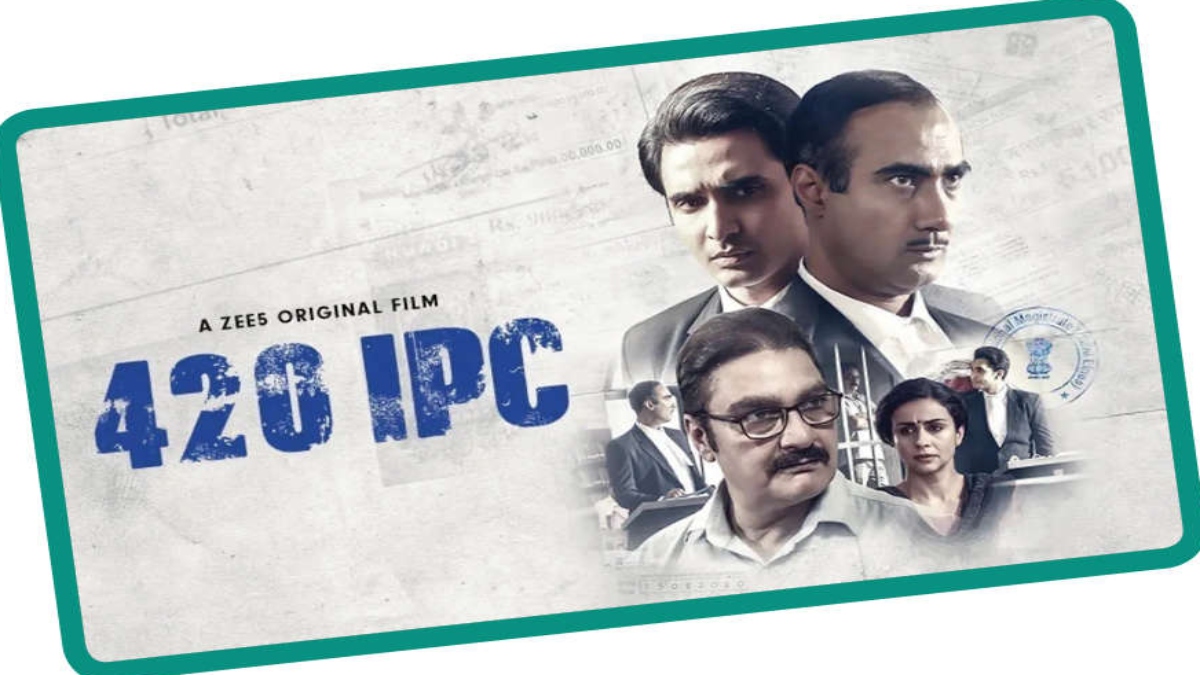With uncertainty still looming over, the OTT platforms continue to make merry. A lot of the small and medium budget films are making their way directly to the OTT platforms. Manish Gupta’s ‘420 IPC,’ which is currently streaming of ZEE5, is essentially a courtroom drama that’s the latest in the long list of such films. Produced by ZEE Studios and Rajesh Kejriwal and Gurpal Sachar under their banner Kyoorius Digital P.L, ‘420 IPC’ stars Vinay Pathak, Arif Zakaria, Ranvir Shorey, Gul Panag and Rohan Vinod Mehra in major roles. The film revolves around a chartered accountant Bansi Keswani (Vinay Pathak), who gets arrested for an economic offence. Mehra plays the part of Pathak’s defence lawyer with Shorey essaying the role of an eccentric public prosecutor and Panag portraying the part of Pathak’s wife.
Over the years, we have seen a lot of Indian films and series set in a courtroom making a mockery out of the judicial processes. We all have seen legal dramas which are all about loud dialogues and histrionics. And wherein the courtrooms are depicted as circuses and the judges are supposed to be ring masters yelling “Order! Order!” again and again. But all that has been changing gradually with filmmakers striving for realism in place of melodrama. In recent times, we have witnessed a decent number of well-made courtroom dramas which have brought some dignity to the genre. One such film is ‘Section 375,’ which is also based on a screenplay by Gupta.
Towards the end of ‘Section 375,’ a female lawyer tells her mentor, “Sir, I don’t think that the justice was served.” The senior lawyer retorts, “We are not in the business of justice. We are in the business of law.” The lawyer’s remark makes it absolutely clear that justice and law are not synonymous. At the end of the day, all laws are subject to human interpretation and a good lawyer understands that there are enough provisions and technicalities to be toyed around with. It all boils down to one thing—whether you can prove it in the court of law.
Now, Keswani comes across as a simple Chartered Accountant who has influential clients like the Deputy Director of MMRDA. When this client is arrested by the CBI for a 1200 crore scam and another client accuses him of stealing and forging 3 blank cheques of Rs. 50 Lakhs each, Keswani’s life turns upside down as he fights the grave accusations of theft, forgery, and attempted bank fraud. Is Keswani a crook or a victim? Well, that’s really not the most important question. The real question is: Can Keswani’s lawyer prove his innocence or not?
Having explored murder mysteries and rape cases in his previous films, Gupta wanted to make a suspense film that did not involve any gruesome crime and had an undercurrent of humour. It was during his extensive search for ‘Section 375’ that he got the idea for a film based upon court procedures in economic offence cases which have been an unexplored realm as far as Hindi cinema is concerned. That’s how ‘420 IPC’ came into being. Just like ‘Section 375,’ the screenplay again is very good. Here is an engaging courtroom drama with a tight script with an edgy plot that keeps the audience hooked till the end.
The acting performances are solid all around. Vinay Pathak shines yet again in a role that comes across as deceptively simple even though it has several layers. Rohan Vinod Mehra delivers another measured performance following his impressive turn in the 2018 film ‘Baazaar’. Gul Panag also looks convincing in the role of Keswani’s wife. The film’s real surprise package is Arif Zakaria who never ceases to amaze with his versatility. Perhaps, the only weak link in the acting department is Ranvir Shorey whose portrayal of a public prosecutor leaves a lot to be desired.
‘420 IPC’ has its share of weaknesses but there is no denying that it’s a well-made courtroom drama. While it lacks the brilliance of ‘Section 375,’ it nonetheless succeeds in presenting the court procedures in economic offence cases which is one area that largely remains unexplored as far as Hindi cinema is concerned. Writer-Director Manish Gupta whose earlier credits also include films like ‘Sarkar,’ ‘Darna Zaroori Hai,’ ‘The Stoneman Murders,’ and ‘Rahasya’ shows great control over the material at hand. With ‘420 IPC,’ he attempts to tread uncharted territories and dares to ask difficult questions about our judicial system and the society at large. It’s heartening to see a well-researched courtroom drama with a taut storyline and without any gimmicks.























